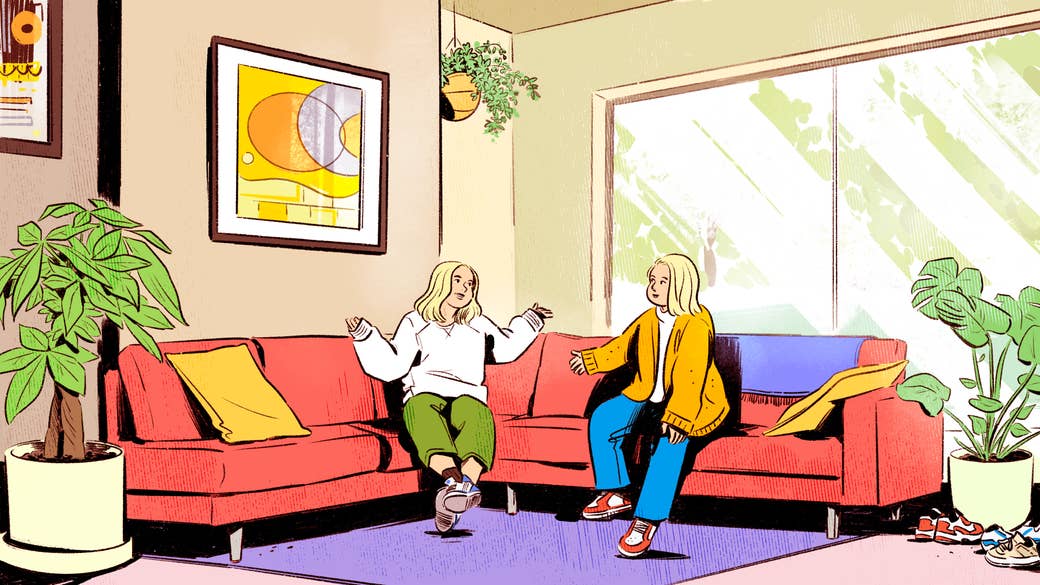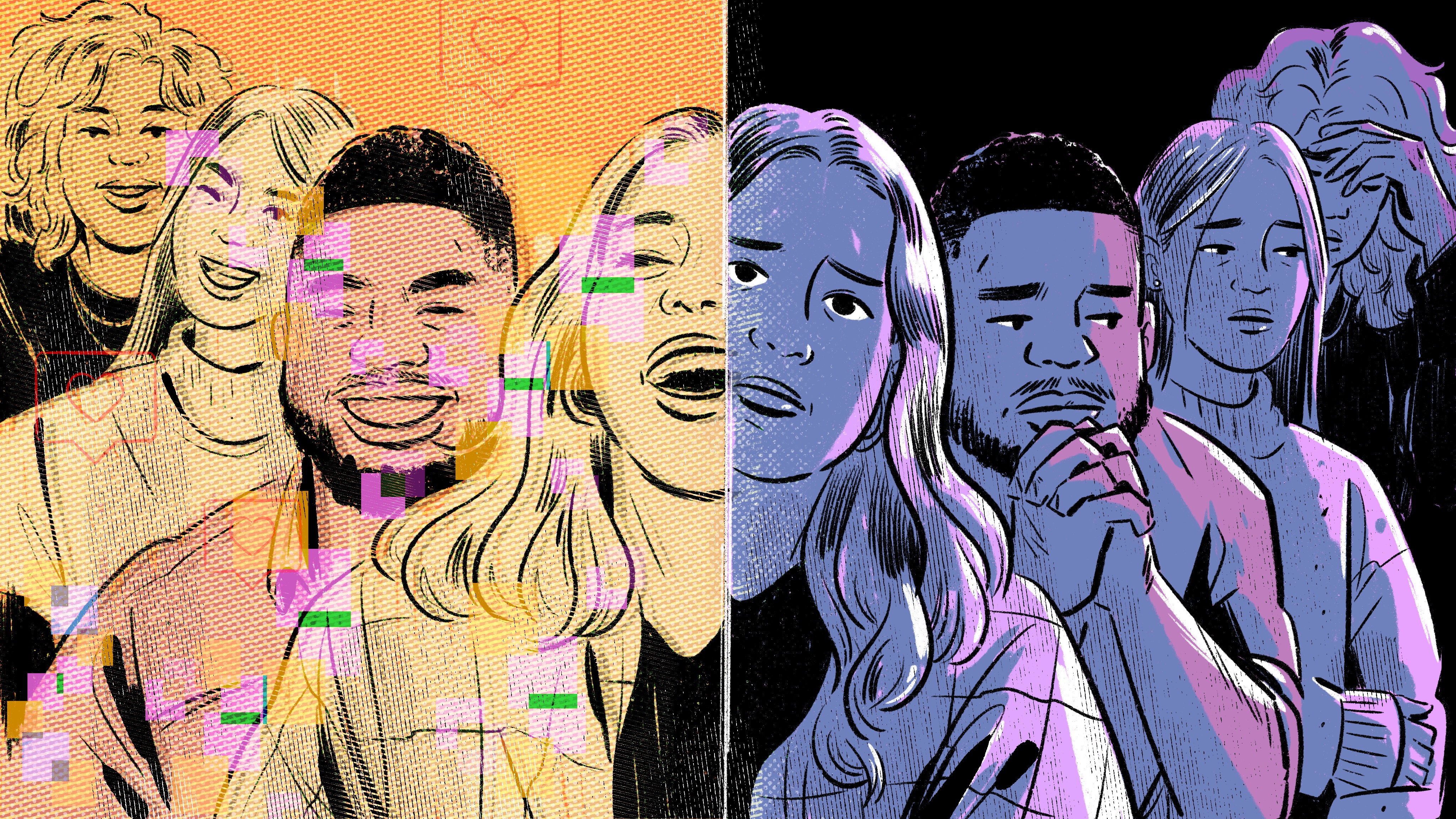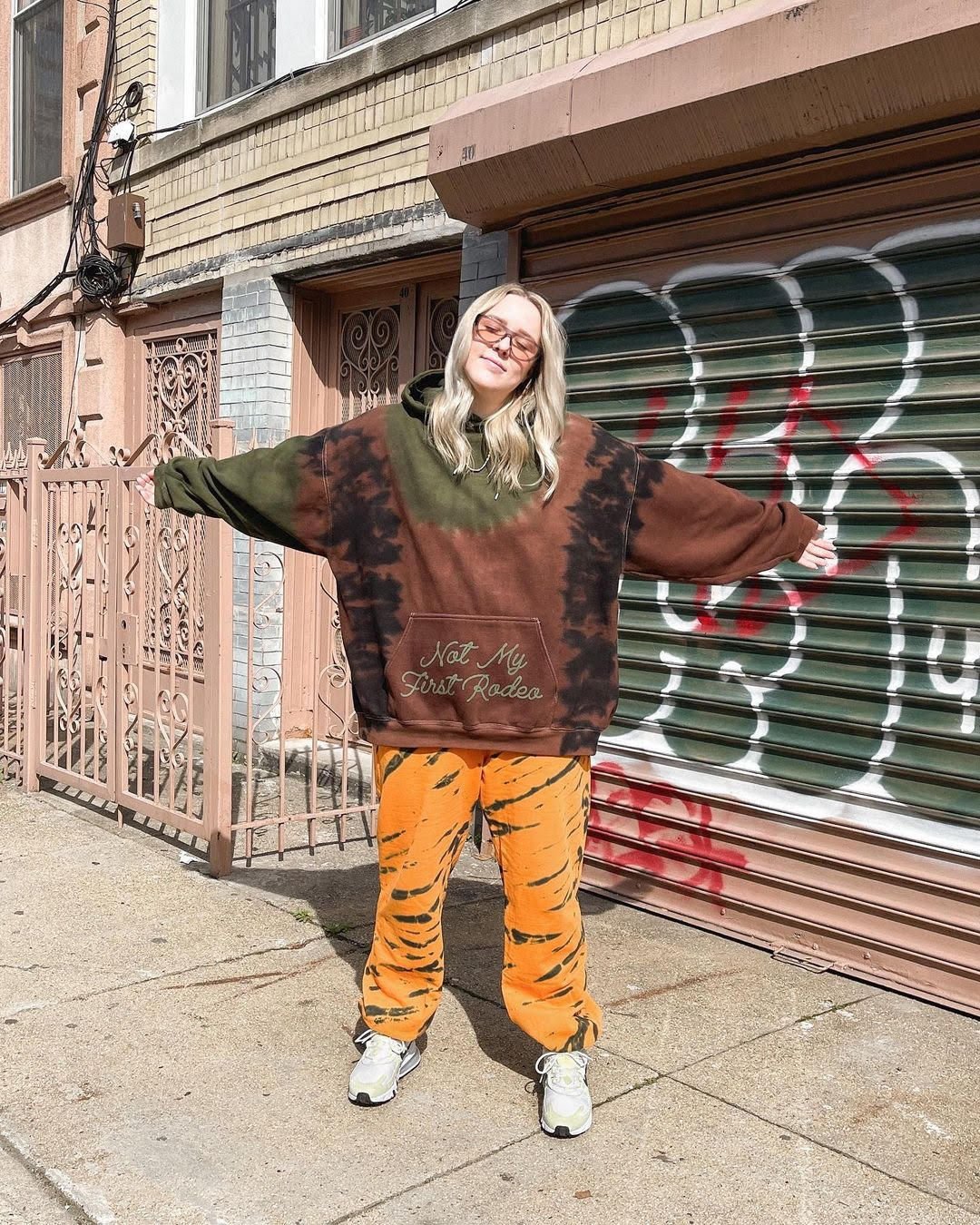
We all have that one friend (or are the person) who could use therapy but who also has a million excuses not to go. Some of those excuses are valid—like high costs and sub-par insurance coverage. Others are steeped in old-school stigma around seeking help, like “I’m not crazy.” But whatever barriers exist, real or imagined, mental health care is one of the best investments any young adult can make. And getting help doesn’t have to look like coughing up a copay for someone who couldn’t tell your Air Jordan 3s from your dad’s old Reeboks, in a poorly decorated Midtown shoebox. Instead, you can step into Liz Beecroft’s Flatiron office, where you might end up kicking back in an Eames chair surrounded by a concrete CB2 waterfall desk and basketball tchotchkes, spending your session kiki-ing over her coordinated hoodie and Dunks.
A common misconception people have about therapy is that you have to be suffering from a serious mental illness or something tragic has to have happened to you for you to justify going—but that’s not always the case. Enter Beecroft, LCSW, psychotherapist, and certified sneakerhead, who picked up the DSM-IV manual after benefitting from years of therapy herself. Growing up, the 30-year-old struggled with anxiety that eventually progressed into panic attacks during her stints at sleepaway basketball camp. Her athletic performance and personal relationships began to suffer, so she sought out the help of a therapist. Cut to her college career, where she left home and the separation anxiety followed. Continuing therapy was crucial to her well-being—and that’s when she had a lightbulb moment and realized the impact she could make by switching her major, pursuing a license, and offering therapy to others.

But at first, Beecroft’s non-therapeutic passions didn’t seem to line up with her new career path. She grew up worshiping Allen Iverson, playing ball herself, and got into sneakers at age 10, acquiring memorable models like AI Questions, multiple versions of the Answer, Jordan 17s and 18s, and even Etnies and Vans. She dealt with sometimes feeling the sneaker and streetwear communities didn’t take her seriously, because she didn’t work in the industry—and on the flip side, she knew she didn’t show up as the average, business-casual therapist with a stuffy office—and she really didn’t want to compromise on that front.
“I recently changed my mindset to learning that as a therapist, my job is to empower other people to show up as the best versions of themselves and to live their lives authentically,” Beecroft says. “So it’s a little hypocritical of me not to do that myself. And as long as I’m not hurting anyone or causing harm, my mindset around it now is: I’m not a therapist for everyone, but I am a therapist for people who do see themselves in me in some capacity.”
“I recently changed my mindset to learning that as a therapist, my job is to empower other people to show up as the best versions of themselves.”
And that sentiment speaks to an important part of Beecroft’s ethos as a clinician at her private practice MENTL.SESH: showing up authentically (for her that usually means in a hoodie and the latest Crocs collab), truly meeting people where they are, and validating their struggles in a way that a traditional, buttoned-up therapist might not be able to. With Beecroft’s strong online presence offering a glimpse into her street style drip and love of basketball, she often gets hit up by high-profile athletes and public figures in the sports world who are struggling with things like pressure from their followers to be “superhuman” or anxiety around critical comments about their performance on the court. Some of them even come in with previous bad experiences talking about it in therapy. “I’ve had so many clients that have had experiences with other therapists that have said, Just talking about social media in sessions, I felt like the therapist was judging me, and I get it,” she explains.
“You look at 2020, and that was really the only way for a lot of people to stay connected. There’s people who have said, Well, my therapist just told me to stop using social media or delete the apps,” Beecroft says. “And you know, for me, that’s not realistic when social media is a part of my job, or I’ve worked with clients where it’s part of their job. You can’t just delete the app. So you have to figure out how to create a healthier relationship with those things.”
As someone who’s genuinely immersed in the culture a lot of her clients are a part of, Beecroft is able to give her clients and audience practical suggestions for whenever they find themselves in a negative spiral after discovering an ex’s TikTok.

“I think it’s [about] being mindful of what you follow, what you engage with—algorithms are really powerful, especially the TikTok one. So being able to be intentional about what you engage with when it comes to content and being aware of what certain people or pieces of content bring up for you,” she says. “If it’s something that you find is triggering, asking yourself and digging deeper, why might that be triggering? And if it’s something that you might need to mute until you can process and work on that and then revisit it later, once it’s dealt with, fine.”
Still, simply being mindful isn’t the whole answer. Beecroft adds that, “Setting those boundaries, following accounts that you find to be uplifting, motivating, empowering, inspiring, rather than ones that make you feel like you’re comparing yourself to other people,” can make a huge difference. “I often say, Don’t compare your IRL to other people’s URL. Because we only really share the good in our lives, but at the same time, a lot of us right now are really struggling and we just don’t post about that.”
And while pretty much anyone, whatever their unique challenges may be, could benefit from therapy, Beecroft appreciates the very real obstacles many people face when it comes to accessibility—from financial strain to lack of education on how or when to get quality help.
“There’s this concreteness with physical health, you can see that you’re sick. There’s some way to measure that. Whereas mental health, you can’t. It’s invisible. So raising more awareness on the fact that it does exist. Everyone has mental health. It doesn’t mean you have mental illness, but at times we do struggle, and it’s OK,” she says.

That’s why she takes an innovative approach to education—bridging the gap between sneakers, style, and mental health through internal workplace mental health training for companies in the sneakers and streetwear industries, as well as via fundraising collaborations with the likes of Jeff Staple, where all the profits go back to mental health organizations, and Instagram outreach ranging from journal prompts and aesthetic affirmations, to an infographic on grief centered around the news of Virgil Abloh’s recent passing.
Combining her passions wasn’t easy—it took years of resisting imposter syndrome and continuously checking in with herself on what felt authentic to her, and strategizing on how she could bring her dream career to life. But to Beecroft, who’s now spending her days working to better the brands she truly supports, directly helping athletes she looks up to, building her business out exactly as she envisions it, and doing it all while getting her fits off… the payoff has been worth the wait.
*The information contained in this program is not intended to dispense medical advice, and is not intended for self diagnosis or treatment. If you have any questions or concerns about your health, and/or before starting or stopping any treatment or acting upon any information contained in this program, you should contact your own medical physician, or health-care provider.

